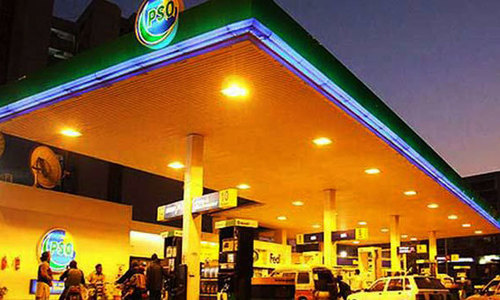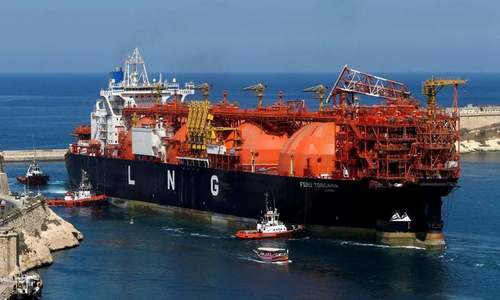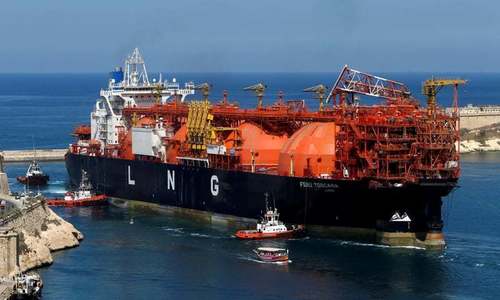THIS is now getting suspicious. What looked like rank incompetence about a year ago is now beginning to smack of malfeasance. In case you have not had a chance to follow how this government is repeatedly fumbling the business of LNG imports, here is a snapshot of the latest episode on Tuesday. There are many more.
In mid-July, Pakistan State Oil tendered in the spot markets for one cargo of LNG to be delivered in August. When the bids came they were priced above 27pc of crude. So if the price under the long-term contract translated to $9.6 per unit, the spot price in July that Pakistan received in response to its tender was above $20, which would make it the most expensive LNG ever to be purchased by the country, and possibly in the world at that time. PSO says it scrapped the bid and decided to tender again, on Aug 5 in hopes of fetching a better price. But somehow the price ended up getting notified by the oil and gas regulator, Ogra, five days later on Aug 2 and stayed notified until this newspaper carried it in a story.
Consider how the system works to understand this properly. There are two entities in Pakistan that are authorised to buy LNG — PSO and Pakistan LNG Limited, or PLL for short. The country’s requirement is communicated to them, and they float tenders in global LNG markets asking for bids for delivery on the specified dates. Once the bids come in they approve some, reject others and forward an ‘LNG price determination’ to Ogra, telling the regulator ‘this is the price at which we will be getting LNG for the forthcoming month’.
The price determination document is quite detailed, consisting not just of the price at which the LNG is being bought, but many other costs that are itemised in painstaking detail, like transmission losses, retainage fees, margins allowed to PSO and PLL as well as the terminal operators who re-gasify this LNG and inject it into the country’s distribution network. Some of these costs can vary as the days pass, and because Ogra has to notify a price at the start of the month for the forthcoming month, it calls its price determination ‘provisional’ because a few of the line items in the cost build-up could change as the days pass. In reality, these changes are very small, rarely more than 1pc of the total cost. The provisional nature of the cost never refers to the price at which the LNG is being purchased from the supplier since that is fixed as per the tender.
Consumers could be billed according to that notification but media should not report it?
On Aug 2, Ogra uploaded on its website the LNG price determination for the month of August as is usual practice at the start of every month. From the moment this document is uploaded, those customers buying LNG start getting billed as per the price notified in the document. And in this price notification, Ogra included one cargo of 3.2 million units priced at 27pc of crude, or $20 per unit, more than double the price at which the LNG from the long-term contract was being procured in the same month.
The next day this newspaper ran a story announcing this on the front page. But within hours, Hammad Azhar, the energy minister, took to social media to denounce the story as “fake news” saying this tender had in fact been scrapped days ago. But the question still remained: how did Ogra end up notifying a price on the basis of a tender that had already been scrapped? Since both the ministry and PSO have stated their position, perhaps Ogra should now clarify where they received the price determination from since their role begins after bids have been accepted and passed on by PSO.
Read: The LNG fault lines
A few hours later, Ogra released a public statement saying only that its LNG price determination issued the previous day is being withdrawn because they have been informed by PSO that the tender has been scrapped. As an aside, I think this might be the first time I’ve ever seen Ogra actually withdraw an LNG price determination. For a day that price determination was up on the regulator’s website and apparently nobody from the government noticed. Most likely some bills were also issued as per the new price, yet not a squeak from anywhere. An LNG price was notified on the basis of a scrapped tender and Hammad Azhar only woke up to it after reading about it in the newspaper. Then his first reaction was to pounce on the newspaper and claim it was “fake news” rather than ask how this had happened. Consumers could be billed according to that notification but media should not report it?
On a good day we could say this was a monumental level of incompetence and foolishness. But Tuesday was not a good day for Hammad Azhar. The cost to the country of the foolishness plaguing LNG procurement — to be the subject of a future column — is now in the hundreds of millions of dollars. And in this game one party’s loss is another’s gain. Last year, they received an offer to buy long-term LNG at $4, and they refused it. Today, they are paying around $15 instead in the spot markets, compared to $9.6 in the long-term contract that they vilify because it was the handiwork of the previous government. Time and again we see them doing things whose net effect is to sabotage LNG supplies, either by delaying orders or driving up the cost or both. It is high time to start asking whether or not this might be deliberate.
The writer is a business and economy journalist.
Twitter: @khurramhusain
Published in Dawn, August 5th, 2021














































